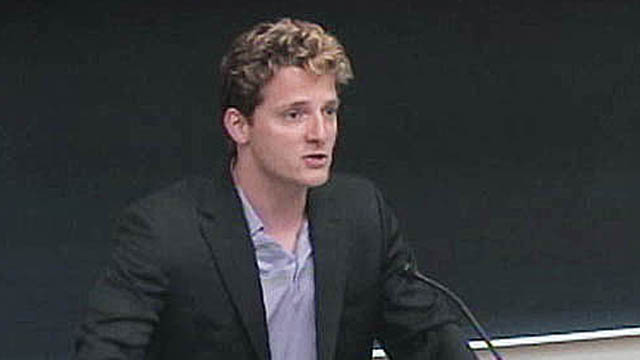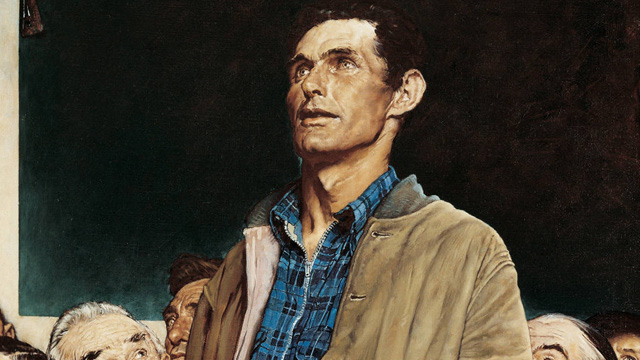What happens when state budget cuts pinch criminal justice resources? The Economist says creative solutions emerge, solutions which are in turn more just than their predecessors.
All Articles
"Could financial incentives that encourage fat people to lose weight solve the obesity crisis?" Experiments in paying people to lose weight have met with success in the U.S. and U.K.
"Americans, plugged in and on the move, are confiding in their pets, their computers, and their spouses. What they need is to rediscover the value of friendship."
There’s a telling moment early on in Alison Chernick’s 2004 film The Jeff Koons Show, now available on DVD from Microcinema. Jeff Koons muses on his idyllic childhood and how […]
The Fourteenth Amendment has come under concerted attack in recent days. Some conservatives have talked about repealing the Citizenship Clause, which says that “All persons born or naturalized in the […]
Who hasn’t suffered the frustrations of moving large boxes, ungrippable, awkward and back-bending? Move-It, a simple kit of self-adhesive cardboard parts by designer David Graham, offers a potent antidote by […]
These are things now that are in the realm of science fiction but I think that people in the coming years will start hearing more and more explosive results as […]
That’s right. It’s happening. Print is being phased out and new digital platforms, which will require subscriptions to read, are being phased in. Today, a news corporation, a journalist and […]
“Over the last decade there has been a fundamental revolution in how we communicate,” says Matthew Nisbet, professor of communications at American University and Big Think’s newest blogger. The rigid […]
Revolutions in communication technology and digital media have transformed almost every sector of society, altering the way we express ideas, participate in public debates, connect with others, entertain ourselves, and […]
Birds do it. Bees do it. But primate species don’t sing and dance, except for Homo sapiens. Why is music-making part of human nature, then? Why do we enjoy singing […]
American support of President Hamid Karzai in Afghanistan mirrors its ill-advised support of Ngo Dinh Diem in Vietnam. A shortsighted and simplistic foreign policy is to blame.
Mexico's President Felipe Calderón has militarized his country's war on drugs, a task once reserved for the police. The consequences have been dire, says the editor of Mexico's La Jornada.
"China's growing thirst for water is driving one of the world's biggest mass relocations, with 440,000 people leaving their homes to make way for a huge man-made canal project."
"Dawkins ignores the possibility that God is a very different sort of being than brains and computers." A philosopher explains his claim that Dawkin's arguments are 'demonstrably faulty.'
"Needless to say, it is not just the financial crisis that gets reduced to rash hyperbole." A sociologist asks why our political discourse is often reduced to platitudes (it's not because we're dumb).
"Three volunteers running the distributed computing program Einstein@Home have discovered a new pulsar in the data from the Arecibo Observatory radio telescope." Wired Science reports.
"America’s biggest—and only major—jobs program is the U.S. military." Robert Reich says we need a jobs program for public goods like light-rail and renewable energy, not outmoded weapons.
"The search for artificial intelligence modelled on human brains has been a dismal failure. AI based on ant behaviour, though, is having some success." Now engineers study ant collectives.
"The Democratic Party has moved to the left even as its take from financiers has soared," says a new book on politics. Slate replies that a Democratic move to the right better explains the donations.
"So far, so Minority Report." The New Scientist heads to Los Angeles to investigate the development of gesture-based computing, a fun exercise intended for serious number crunchers.
Just as better off New Yorkers head for the Hamptons in August and the French head en masse on holiday, clogging up roads, the British see August as the month […]
The Ice Storm, Rick Moody’s novel, was published in 1994, set in 1973. One of the things readers who loved the book but were not yet born (or were barely […]
There are few things we take more for granted than the concept of gravity. Through history, physicists like Isaac Newton and Albert Einstein have developed theories about the Universe that […]
It’s been a good year for Emily Pilloton, founder of social-good nonprofit Project H Design and author of the excellent Design Revolution: 100 Products That Empower People. A PopTech fellow […]
In the study of uniquely human traits—language, mathematics, moral behavior—there are few academic stars as bright as Marc Hauser, a psychologist at Harvard. His collaborators in academia are top-shelf (they […]
David Adamovich throws knives for a living. Really big knives. With 25 world records under his belt, Adamovich is the world’s fastest and most accurate knife thrower. He also holds […]
This has been the “Summer of the Spill.” Since the Deepwater Horizon drilling rig explosion on April 20, 2010, the epic BP oil spill has oozed into imaginations trying to […]
Why are we using 1970’s style distribution techniques for anything in 2010? I was tooling through the black conservative website Booker Rising when I came across a comment by one […]
"By focusing all our attention on whether we need a bigger stimulus or a smaller deficit, we’re flying blind." TNR says we should concentrate on deeper reforms toward a knowledge based economy.















